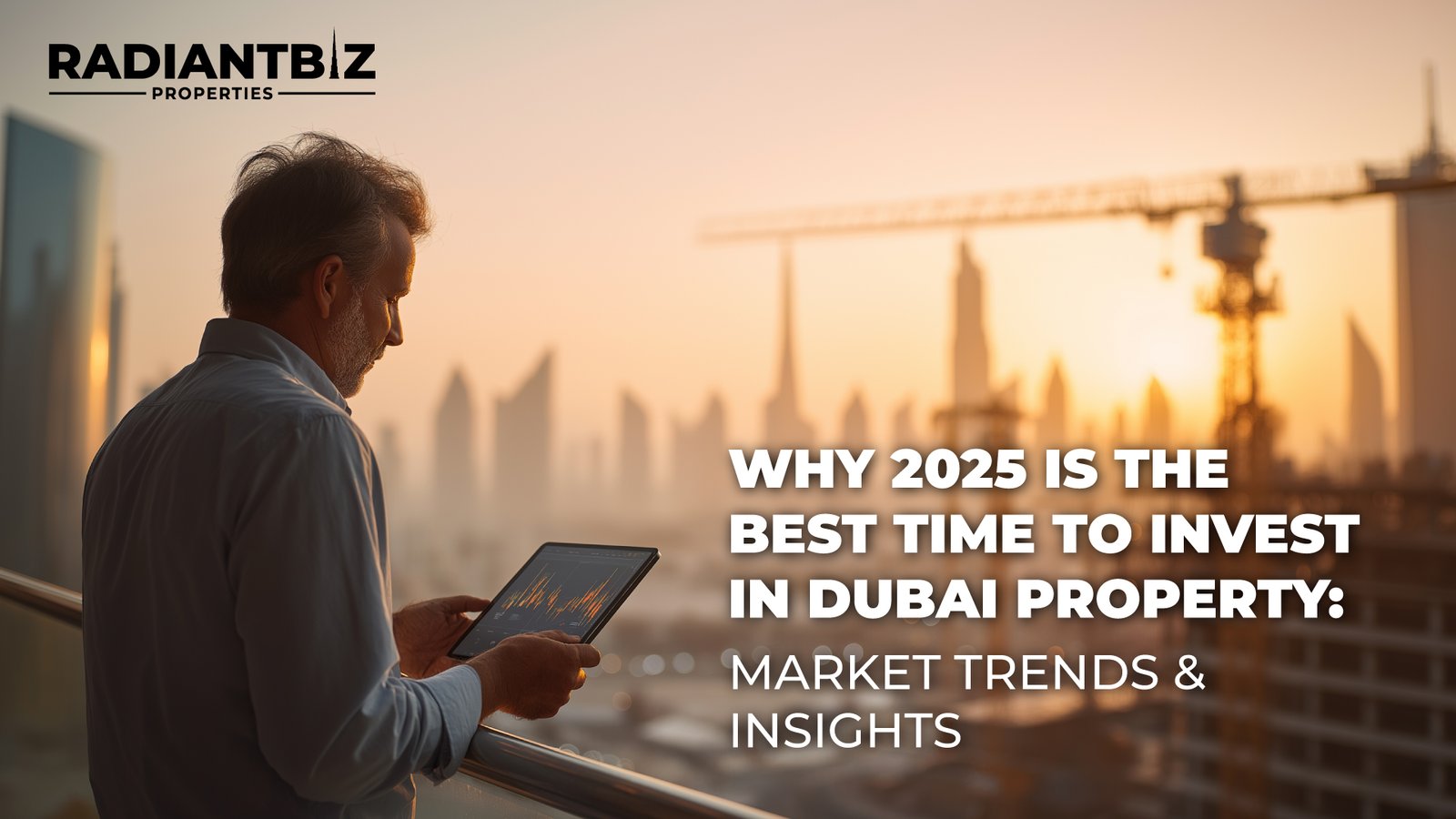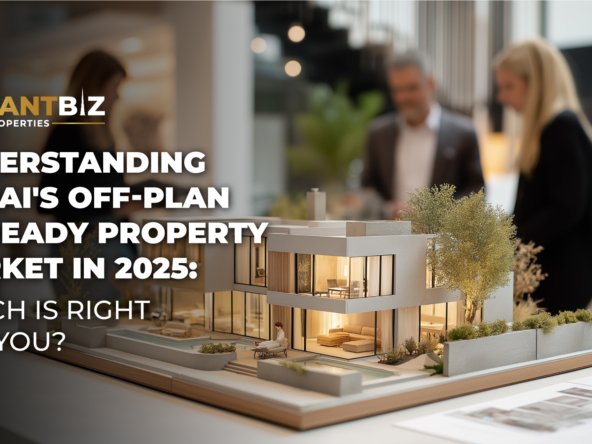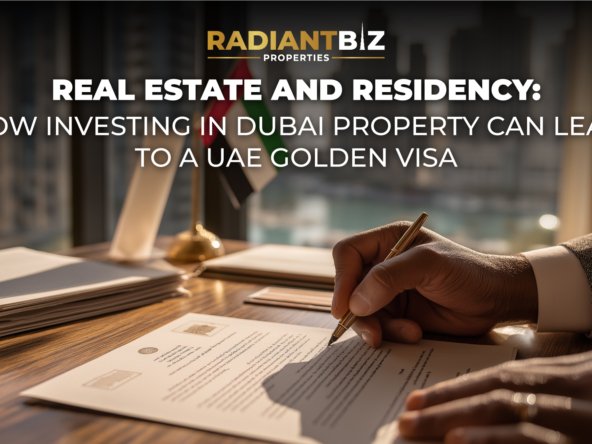Dubai has long been known for being among the most dynamic and thrilling real estate markets in the world. The city itself has, in the past twenty years, developed from a desert post into a global hub for the luxury way of life, tourism, commerce, and finance.
Today, it is ranked among the most promising locations to invest in real estate with its pioneering mix of new infrastructure, political stability, and business-friendly policy. As the global economy takes a turn and markets stabilize, 2025 is a superb year to invest in Dubai real estate.
We will look into why 2025 is such an excellent window for investors in this article by looking at recent market trends, policies of the government, and experts’ views.
Dubai’s 2025 Real Estate Market: A Complete Overview
As of 2025, the Dubai real estate market is a dynamic, stable, and growing platform. Transaction volumes have been steadily increasing, with a significant increase in residential and commercial property transactions, reports the Dubai Land Department (DLD).
Wealthy neighborhoods such as Billionaires’ Row, Dubai Marina, Business Bay, and Jumeirah Village Circle (JVC) are still the favorite hotspots for local and international investors.
One of the highlights in 2025 is a healthy balance between demand for ready-to-move-in homes and off-plan units. While off-plan units saw a revival during the post-pandemic era due to attractive payment plans and project launches, ready homes have remained favorite picks among homebuyers who prefer possession or desire to earn rental income.
The buyer profile is diversified, featuring investors from Europe, India, Russia, China, and the GCC region, which highlights the global connectedness of Dubai.
Why 2025 is the Perfect Year to Invest in Dubai Real Estate
There are certain essential factors that fall into place in 2025, which makes the perfect year to invest in Dubai property:
- Post-Pandemic Recovery and Economic Resilience
The rapid and effective response of Dubai to the COVID-19 pandemic has supported a strong economic recovery. Proactive public health actions by the government, along with swift vaccine campaigns, served to rebuild business confidence.
Activities such as Expo 2020 Dubai (which took place in late 2021 and early 2022) served to significantly revive tourism and business, increasing property demand. Beyond pandemic recovery, Dubai’s commitment to economic diversification continues to strengthen its foundation.
Moving away from oil dependency, the government has prioritized sectors like technology, finance, renewable energy, and tourism. This diversification has contributed to a stable and growing GDP, robust foreign reserves, and increased investor confidence—important indicators for property market growth.
- Attractive Returns on Investment (ROI)
Dubai has built a reputation for delivering some of the world’s highest rental yields. In 2025, rental yields in top locations such as Dubai Marina and Downtown Dubai stand at between 6% and 8%, while luxury and waterfront apartments occasionally exceed this level.
This is far higher than in most cities of the world where rental yields are generally below 4%. Capital appreciation for the Dubai property market has also reflected encouraging trends.
Certain pockets, especially branded and waterfront developments, have recorded stable price appreciation powered by high demand and short supply.
The combination of good rental income and capital appreciation renders Dubai property an attractive option for investors interested in diversified portfolios.
- Beneficial Regulatory Reforms
Dubai has embarked on a series of market-oriented regulatory reforms in the recent past, some of which are very important in 2025. The launch of 100% foreign ownership in the majority of business sectors, including real estate investment, removed long-time barriers to facilitate full foreign ownership of real estate property.
Moreover, Dubai Land Department has also continued with digitizing and simplifying property transactions. Paperless transactions, electronic property application, and swift transfers of titles have promoted transparency and reduced transaction fees and duration.
In addition, reduction in property transaction fees in some free zones has reduced investors’ entry costs.
- Golden Visa and Residency Incentives
One of the most appealing incentives to invest in Dubai property in 2025 is the Golden Visa program. With the aim of encouraging long-term residency, the Golden Visa offers residence permits for real estate investors that are 5 or 10 years long, depending on the price and type of property being acquired.
The visa can be renewed indefinitely as long as the investor retains ownership of the property. It also allows for family sponsorship, allowing investors to purchase residency for their spouses, children, and even domestic helpers.
For expats looking to establish a long-term base or expand business operations in the area, this is an enticing reason to invest in property.
Key Market Trends Affecting Dubai Real Estate in 2025
Off-Plan Property Boom
Off-plan properties have rebounded from a pandemic-induced slump. Developers are offering attractive payment schedules and incentives for early purchase to draw in customers, such as millennials and remote workers who need flexibility.
Off-plan buying typically allows buyers to make installment payments over a number of years while the building is being built, easing short-term cash strain.
Established developers like Emaar, Sobha, DAMAC, and Meraas continue to introduce iconic projects which garner investors looking for quality finishes and sought-after locations.
Off-plan properties also have the potential of capital appreciation when the projects are nearing handover, especially in high-growth areas.
Sustainability and Smart Home Living
Sustainability in the environment and the integration of smart technology have become central themes in the real estate market in Dubai.
More and more, purchasers are looking for properties that are environmentally friendly, have energy-efficient systems, and are equipped with smart home technologies including AI-based security, lighting, and climate control.
Developments such as The Sustainable City are the embodiment of this trend, drawing green-conscious investors and residents. The government of Dubai supports such developments in line with its pledges to the UAE’s Vision 2030 and sustainability initiatives, boosting more green developments.
Branded Residences and Lifestyle Communities
Dubai has emerged as a branded home leader, with luxury apartments linked to such prominent international brands as Ritz-Carlton, Armani, and Bulgari. The developments combine luxury lifestyle with customized services and amenities to appeal to rich investors and owners who want resort-style living.
Lifestyle-focused properties — health-themed communities, mixed-use buildings, and beachfront resorts — are also coveted. These usually command higher resale values and attract high-end renters, making them excellent for long-term investments.
Government Initiatives and Strategic Vision
The Dubai government has a clear strategy for future growth with projects like the Dubai 2040 Urban Master Plan and the UAE Vision 2030. Both these plans are targeted at sustainable city development, diversification of the economy, and infrastructure growth.
Investments in transport infrastructure (metro lines, road networks), healthcare facilities, and world-class schools are improving the quality of life for residents and making the city more attractive to investors.
Developments such as Dubai Creek Harbour, Expo City Dubai, and The Oasis are reshaping the cityscape, unveiling new investment sites with significant upside potential.
Moreover, Dubai’s pro-investor policies focus on easing business setup processes, reducing bureaucratic red tape, and providing regulatory clarity—boosting investor confidence in property markets.
Foreign Investor Confidence and Global Migration Trends
Dubai continues to attract a growing number of high-net-worth individuals (HNWIs) and expatriates seeking stable, tax-efficient, and cosmopolitan living environments. Its geopolitical neutrality and political stability distinguish it from many other global markets.
Unlike London, Singapore, or Istanbul, there is no capital gains tax and unrestricted repatriation of capital in Dubai, making it very attractive to foreign investors.
The city’s growing population, triggered by expatriate migration, creates continuous demand for residential, commercial, and hospitality properties. Recent geopolitical developments elsewhere have also underlined the role of Dubai as a wealth protector and investment diversification vehicle.
Challenges and Considerations for Potential Investors
Though the opportunities are immense, investors need to be informed of some concerns:
Service Charges and Maintenance Fees: These vary between communities and have an impact on net rental yields. One should remember the total cost of ownership before investing.
Developer Creditworthiness: Investing with established and recognized developers reduces risks due to delays in project execution or below-par quality.
Market Cycles and Volatility: Dubai’s property market is subject to cyclical fluctuations, influenced by global economic factors and local supply-demand dynamics. Interest rate changes may also affect financing costs.
Legal and Regulatory Compliance: Navigating property laws, visa requirements, and contractual terms requires due diligence and expert advice.
Engaging professional legal and real estate consultants is advisable to mitigate risks and ensure smooth transactions.
Expert Tips to Maximize Your Property Investment in 2025
To reduce risks and maximize returns, the following should be done:
Choose the Right Place: For stable rental returns, destinations such as Dubai Marina, JVC, and Business Bay are desired. For the long-term appreciation of capital, focus on waterfront and branded residences.
Smartly Select Property Type: Apartments are the ones that give rental yield advantages, and villas and townhouses will certainly appreciate in the future. Commercial property is another opportunity for diversification.
Off-Plan vs. Ready Properties: Off-plan purchases give lower upfront costs and possible capital appreciation but require patience. Ready properties give immediate rental returns and occupancy.
Work with Licensed Professionals: Utilize RERA-approved brokers and consultants who understand the nuances of Dubai’s property market.
Stay Updated on Policies: Be attentive to regulatory announcements from DLD and government announcements on property and visas.
Why You Should Invest in Dubai Property in 2025
Dubai’s property market in 2025 provides a specific combination of economic resilience, investor-friendly reforms, green development trends, and greater global attraction.
If you are looking for secure rental returns or massive capital gains, Dubai has something for you to achieve your investment goals.
Thanks to government support like the Golden Visa, robust infrastructure projects, and stable geopolitical climate, there is all the reason to invest now before prices rise further.
The time to act is now—seize the opportunity to be part of Dubai’s thriving real estate story in 2025 and beyond.
Seek our professional on-the-ground guidance, contact us via mail at info@radiantbiz.com or WhatsApp & call us at +971 55 234 7124!




